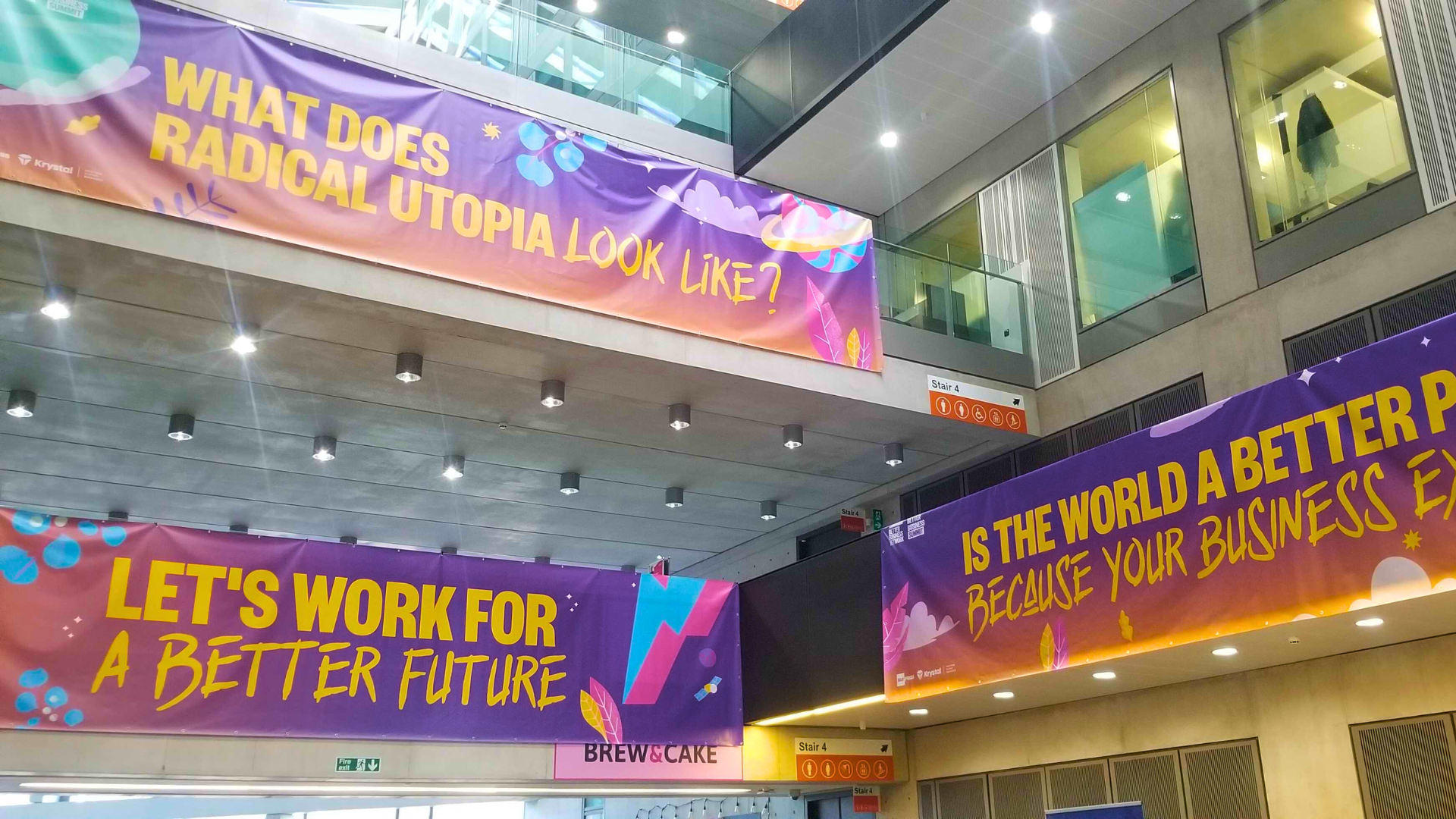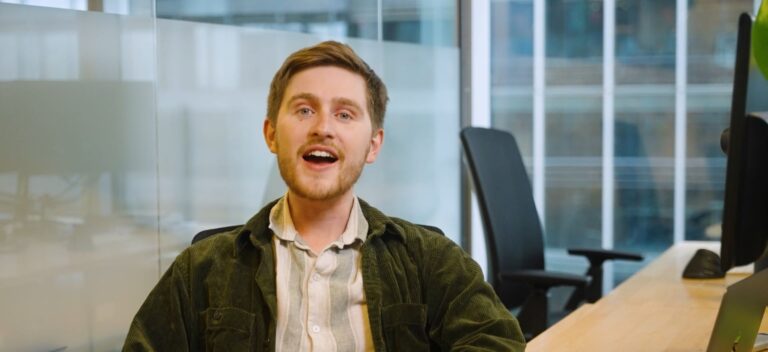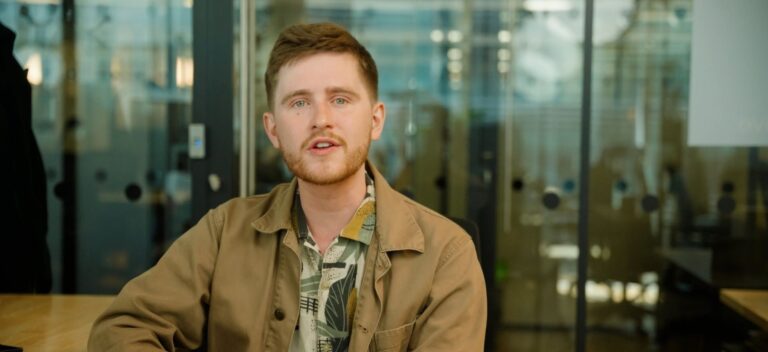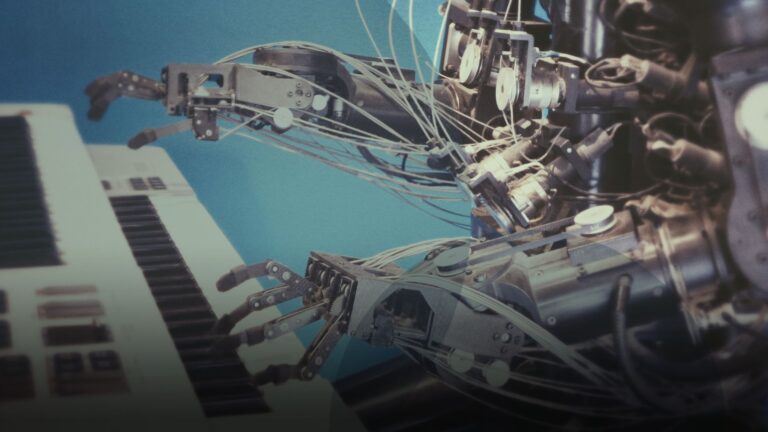
Charlie Stewart
Senior Content Strategist
Charlie brings his creative flair developing content and copywriting across all of our campaigns.

Base Creative’s Charlie Stewart attended the Better Business Summit in Manchester. Here are his thoughts for businesses navigating the climate crisis.
Ask yourself these questions.
These are two examples of actions taken by speakers at the Better Business Conference in Manchester last week, which I had the opportunity to attend.
While I understand the motivation behind both approaches, I also respectfully disagree with them.
In this article, I want to attempt to explain why, and to sketch out the framework which I believe is far more useful for businesses that want to see more action taken – that by understanding the history of major societal change through a material lens, we are in a better position to effectively direct our efforts to protect the planet.
Both approaches mentioned above appeal to the idea that the most powerful people in business and politics need to be won over in order for the UK to successfully transition to a sustainable economy. This is true.
Where I believe they go wrong, however, is that these approaches are predicated on the idea that the fight for a sustainable economy will be won by targeting hearts and minds first.
The first target needs to be pockets. Hearts and minds will follow, but targeting hearts and minds alone will prove insufficient. Only by economically incentivising sustainable practices and penalising unsustainable ones will such a seismic, necessary change be able to take place.
Part of the reason this hearts and minds approach is so appealing is because it aligns with the way we’re often taught about historical change. We’re taught to ascribe change to individuals or small groups of individuals whose ideas helped turn the wheels of history.
Take the USA’s Founding Fathers, for example. A lot is said about their drafting the Declaration of Independence and later the Constitution, and an ideological commitment to life, liberty and the pursuit of happiness.
Less is said about the economic downturn that faced the 13 colonies in the years prior to the revolution, subsequent popular unrest against the colonial merchant class to which many of the Founding Fathers belonged, and that merchant class’s efforts to turn that economically-driven anger against Britain rather than themselves, protecting their interests while also opening the possibility of further westward expansion – and money to be made – in a newly independent state.
While individuals within a movement may be driven by ideas…
You might be able to change the mind of an individual by having a heart-to-heart, but when it comes to large-scale societal change, material conditions need to change for opinion to shift.
In many historical cases – colonialism and transatlantic slavery, for example – more formal ideologies were developed by the beneficiaries after the fact to justify pre-existing economic relationships in their favour.
An example of mass societal change which was brought up in one Better Business Summit talk was the anti-apartheid movement in South Africa. The question was whether its success could be used as a model for large-scale environmental change.
There was discussion about how important it had been to get South African businesses on board – how winning them over was key, and how the same would be equally important when fighting climate change.
There was, however, a vital detail which was missed out from the main discussion which was only able to be raised briefly by host Ngunan Adamu before the panel ran out of time. That detail was the massive boycott which took place against South African businesses and the role of local councils and trade unions in pressuring UK banks to disinvest from the apartheid state.
Businesses had a huge role to play in making that massive (and still recent) change possible, but it wasn’t because they had been ideologically won over – it was because their material interests had been forcibly changed, leaving their public-facing ideology to play catch-up.
Whether it’s through positive reinforcement or penalisation, understanding history and the future through a material lens is what allows for the most effective action to create change.
This isn’t to cynically say that each individual is motivated by money. It’s not like every anti-apartheid activist was looking out for their material interests – though you could certainly do a material analysis of what led the anti-apartheid movement to gain traction. Whatever motivates you personally, however, targeting the material conditions of forces opposed to environmental action remains the only way to drive the kind of historic change we need.
So what happens when you join a political party or business board to attempt to change it from the inside without targeting its material interests?
You run up against those very material interests. You might change a few hearts and minds, but your chances of winning are very, very slim. Those interests need to be changed first.
This is where I found the Better Business Summit panel on B Corp very heartening. For those who don’t know, B Corp is a certification given to businesses which can prove high standards of sustainability and transparency.
It has its flaws – right now, for example, it’s possible for a business with a great sustainability record to attain B Corp status without paying its workers a living wage, an issue B Corp certifier B Lab is attempting to work on with a new assessment system.
The reason I still find the B Corp model encouraging, however, is because of its markedly material approach. The B Corp certification process is interested in material assessment and material rewards. It looks at your supply chain, your emissions, worker pay and compensation and your clients and how they make their money.
It understands that the bottom line is what matters – and the promise of being inducted into a community of B Corp businesses that give each other more work becomes a material incentive for businesses to get onboard. There’s a reason B Corp doesn’t just ask businesses to sign on to a pledge of allegiance to a better tomorrow – and why similar actions by large polluters are met with scorn and accusations of greenwashing.
Though we’re currently going through the B Corp certification process ourselves at Base Creative, it’s far from the only material-centric approach.
One Better Business Summit panel on environmental law, for example, focused on the question of whether businesses needed to be held more legally accountable for their environmental impact in order to act on it. The answer, from expert and Corporate Partner at Brabners LLP Simon Lewis, was yes.
Before I go too deep down another rabbit hole, let’s wrap up with this…
I believe that material incentives are incredibly powerful – so powerful, in fact, that they have led business leaders who knew about the impact of climate change decades ago to continue to prioritise their short-term material interests, even now as the effects become more and more visible every year.
For those of us who want to make whatever change we can, I believe we need to understand the challenge of tackling climate change from a material perspective if we’re going to have even a small impact.
“Better business” can exist, but it won’t be made better by attempting to win people over without changing their material interests first. A business full of well-meaning people can have a terrible impact on the world around them. A business full of individually terrible people can have a positive impact on the world.
It’s all in the material – that is where pressure needs to be applied, and where change, big and small, needs to be made.
Good luck!
Want to get in touch about B Corp, sustainability or content marketing? Drop me an email at [email protected].

Senior Content Strategist
Charlie brings his creative flair developing content and copywriting across all of our campaigns.
View my other articles and opinion pieces below
Senior Content Strategist Charlie Stewart explains how B2B firms can create authentic, story-driven marketing content that resonates with audiences and builds trust in the age of AI.

Charlie Stewart shares how video content can connect with your audience at the exact moment they’re searching – and why it’s time to treat video as a vital search asset, not just a creative one.

Senior Content Strategist Charlie Stewart shares how Base Creative uses AI to streamline research and content audits – while keeping strategy, creativity, and quality in human hands.

If you’re hoping to create one perfect piece of content so manipulative that it sends your site straight to the top of Google Search, I’ve got some bad news. Exactly how Google’s algorithm works remains a bit of a mystery. What Google has made crystal clear, however, is how its team assesses the quality of […]
